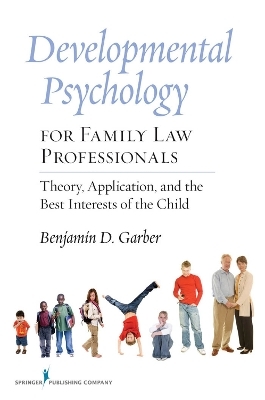
Developmental Psychology for Family Law Professionals
Springer Publishing Co Inc (Verlag)
978-0-8261-0525-7 (ISBN)
The goal of every family social worker and mental health practitioner is to improve family court outcomes in the best interests of the child. This book will assist social workers in meeting this critical goal. ""Developmental Psychology for Family Law Professionals"" serves as a practical application of developmental theory to the practice of family law. This book helps social workers and mental health practitioners gain a broader understanding of each child's unique needs when in the midst of family crisis. It presents the new research tools and techniques with which professionals might better address the developmental needs, synchronies, and trajectories of a given child. Ultimately, this book presents guidelines for addressing the changing developmental needs of children who have experienced crises such as abuse, neglect, relocation, divorce, and much more. Key topics include: Child custody; Foster and adoptive care; Post-divorce disputes; Gay and lesbian caregiving conflicts; Domestic violence cases; Restraining orders; Abuse and neglect charges; Incarcerated parents and visitation rights; Relocation, 'distance parenting,' and the related digital visitation technology; Visitation resistance and refusal/reunification; and, Parental Alienation/alignment and estrangement.
Benjamin D. Garber, PhD, is a New Hampshire licensed psychologist, state certified Guardian ad litem and parenting coordinator. His practice in clinical, consulting, and forensic psychology assists families, agencies, schools and communities to better understand and meet the needs of children, particularly in the context of conflicted family transitions.
Introduction: Why a Perspective on Child and Family Development?
Part One: Child and Family Development for Family Law Professionals
1. Who are the Children Who Come Before the Courts?
2. In re: Frye and Daubert
3. An Historical View of the Child: From Chattel to "Mini-me"
4. Theorists in Brief: Piaget, Erikson, Kohlberg
5. Attachment Theory
6. The Best Interests of the Child (Re-)Defined
Part Two: Common Themes in Child and Family Development Applied
7. Seven Rules That Shape Development
8. Today, Tomorrow and Forever: The Child's Developing Sense of Time
9. Me or You? The Child's Developing Sense of Self Versus Non-Self
10. Blankies, Binkies and the Child's Developing Capacity to Tolerate Separation
11. Impulse Control and the Child's Developing Capacity to Delay Gratification
12. "It Wasn't Me!" Imaginary Friends and the Child's Developing Capacity to Accept Responsibility
13. "I'm Outa' Here": The Teenager's Angry and Ambivalent Wish for Independence
14. Diagnosable Developmental Differences, Family Pathology and Their Forensic Implications
Part Three: Developmental Dilemma and Legal Decisions
15. Psychometrics and Psychological Assessments: From IQ Tests to "Custody" Evaluations
16. How Valid Is Developmental Assessment Under Court-involved Stress?
17. The Moving Target Phenomenon
18. The Dilemma of the "Mature Minor"
19. What You See May Not Be What You Get
20. When Children are No Longer Children
21. Development in the Mirror
| Erscheint lt. Verlag | 30.9.2009 |
|---|---|
| Zusatzinfo | Illustrations |
| Verlagsort | New York |
| Sprache | englisch |
| Gewicht | 674 g |
| Themenwelt | Geisteswissenschaften ► Psychologie ► Entwicklungspsychologie |
| Recht / Steuern ► EU / Internationales Recht | |
| Recht / Steuern ► Privatrecht / Bürgerliches Recht ► Familienrecht | |
| ISBN-10 | 0-8261-0525-4 / 0826105254 |
| ISBN-13 | 978-0-8261-0525-7 / 9780826105257 |
| Zustand | Neuware |
| Haben Sie eine Frage zum Produkt? |
aus dem Bereich


